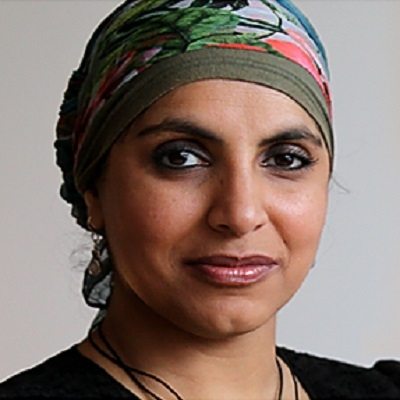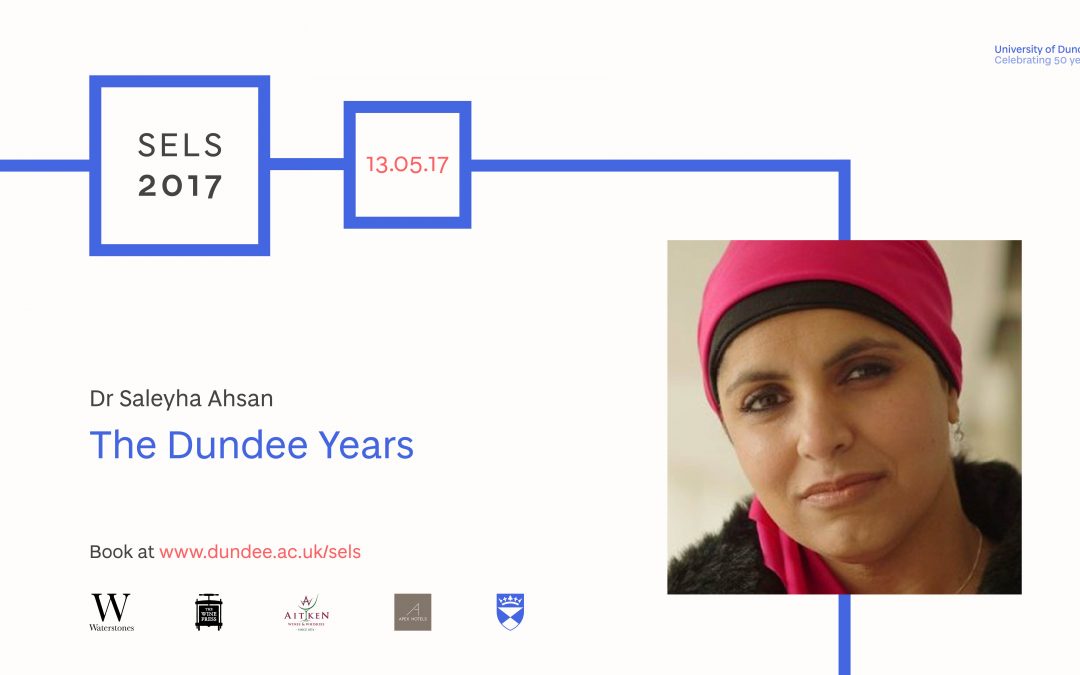Meet…
Dr Saleyha Ahsan, Bachelor of Medicine (MB ChB 2006), University of Dundee

Saleyha is a recognisable face to many having developed her career as a journalist and doctor – appearing on Trust me I’m a Doctor, The One Show and fronting documentaries on access to health care. However it is the path she took to forge this career that makes Saleyha a remarkable person. Having been born in Essex, she moved north to Salford for University – graduating with a Chemistry degree, before getting a placement with BBC Wiltshire Sound as a reporter. While building up her experience as a journalist Saleyha passed her Regular Commissions Board and gained entry to the Royal Military Academy Sandhurst, becoming the first British female muslim to graduate – leading to three years serving in the Royal Army Medical Corps as a Medical Support Officer.
It was while on a tour of Bosnia in 1997, with the Royal Army Medical Crops, that Saleyha applied to study Medicine at the University of Dundee. But studying wasn’t all that she was doing at Dundee, she began working in journalism (working in Palestine and Kashmir for BBC 5 Live and Radio 4 Current Affairs) and began to make independent films. In 2011, after having focused on stories related to military, civil liberties, conflict, global health, development and law, she gained her LLM in International Human Rights Law and Humanitarian Law.
Could Saleyha be one of our most decorated and busiest graduates?
Who are ?
I’m Dr Saleyha Ahsan
Where are you from?
All over – born in Barking, Essex. Mother born in Kenya, Dad born in Pakistan but from India. Currently I call London home but work in North Wales. Scotland still feels like my spiritual home that I’m only temporarily away from.
When did you attend the University of Dundee?
2000
What did you graduate in?
Medicine
What other qualifications do you have?
BSc Chemistry 2.1 and LLM International Human Rights and Humanitarian Law
What do you do?
Freelance journalist and filmmaker, A&E doctor with pre-hospital care, humanitarian doctor
When you left school you were thinking of a career in journalism – what made you choose Chemistry?
I had an amazing chemistry teacher for my resit in A level chemistry. It’s all about the teachers. The first Chemistry teacher I had failed to make me understand it – it was a mystery. Then I went to an amazing school for the resit, Seven Kings High School – crowded but a school with a will to achieve and succeed – it was Mr Gratrix – a teacher from up north with a deadpan humour and who also happened to be the deputy head – who taught Chemistry. He was AMAZING. He unlocked the mysteries and suddenly I felt I had cracked a code only a few can. Chemistry is not for the faint hearted. So that’s what took me onto to do Chemistry. And I have so much to thank Mr G for – with that inspiration I went on to do Chemistry as a degree which then resulted in my unconditional offer to study medicine in Dundee. I was turned down by Manchester and Aberdeen. And I’m so pleased. I found my home in Dundee. I chose it over Glasgow who had also given me an offer.
How did you feel becoming the first female British Muslim to graduate from Sandhurst?
At the time I had no idea – it was only at the end. I think I was more in awe of having been born in Barking, Essex and coming from working class roots that made me feel more like a fish out of water! The rest of it – well that was everyone else’s issue to deal with. It was an amazing opportunity.
You have a lot of strings to your bow, what is it about your work that keeps you going?
Curiosity and ambition. Never fades.
What is your favourite place at the University of Dundee?
Oh so many – I remember when I first came to Dundee after my interview I went to see the library to get the feel of it as I knew I’d be in there a lot. I was at the time still an army officer who had not done any studying for a few years. I recall a moment of panic as I stood there amongst all the books, tables and shelves and almost ran out. Over time when I was a student I began to love it more and more and soon it was a second home. Ninewells was were I learnt about patients, the library was were I soaked in the knowledge to care for them.
My other favourite place was the lecture theatre – again don’t think I’m weird. But I loved it there. I now appreciate the wonderful opportunity to be there and soak up all that was being taught to us – the basic sciences. Sitting there with my coffee, learning, being taught. I loved it. Don’t get me wrong though – I was a slow learner and often had resits but the chance to learn was something I cherished. Just because I wasn’t a genius with a photographic memory like some of my talented peers – didn’t mean I was not going to be in there making the most of the fantastic opportunity to learn.
Who inspired you the most when you were a student here?
We had Grant Lesley – our physiology lecturer and also course director. He was a bear but a gentle bear. I remember a week when I became really quite down and went to see him. I was missing my fellow military colleagues and being amongst my army peers, my troop and just not adjusting well to being a civi. I went to see him to say I was not feeling too great. It hit me with great surprise the challenges of adjusting as an older student to being amongst 17 year olds when you are 30. He was a tower of support and told me to just take a few days off to breathe a bit. I was so grateful that he understood – now there was a man who knew his job and his role. I caused a bit of a stir when I was late returning from a BBC trip to Kashmir after the Easter break – giving them a bit of a challenge in keeping me on the medical student straight and narrow. But he stuck with me – and I remember once, after struggling yet again with getting my exams – he said directly to me – we want you to pass – we want you to become a doctor. I held that and carried it with me for the rest of the five year course. I have much to be grateful for.
Then when I was a clinical medical student it had to be Mr Ballantyne – my supervisor during my neurosurgical attachment. I was hooked. Part of me regrets not going onto follow in his footsteps. I spent all my free time during that year trying to get as much scrubbed up time, assisting Mr Ballantyne, as possible. Because of him and his passion, down to earth manner and his superb way of making us understand the complexities of the brain and the nervous system I was a fan. A Mr Ballantyne groupie. I was super inspired. I don’t do regrets well because I make sure I do the things I feel passionate about to not have regrets but if I’m honest I do regret not carving out my career to be able to work for Mr Ballantyne as one of his juniors. Maybe I’ll apply for a junior clinical fellow post – you never know. I won’t be a surgeon now but I can still appreciate the opportunity to learn to enhance my skills as an emergency medicine doctor. I loved that period of my learning so much.
What was your favourite part of studying medicine at Dundee?
So I’ve already talked about neurosurgery and Mr Ballantyne. I think the favourite part of studying medicine at Dundee was the opportunities to learn in an innovative way. I got to spend time on attachments in Oban, North Berwick, Montrose. I loved it. I even did surgical clinics on Arran. I also was able to think and be creative. I formed links with the Duncan Jordanstone College of Art and Design made my first ever feature length documentary. Telling in that it’s so far the only one I’ve made. Something about Dundee and being a Dundee student and the hub it creates for development made me do things I never thought possible. My film was made with a team of filmmakers from the Art College and we had our debut screening at the DCA. Still one of my most proudest moments as a filmmaker. I hope to one day replicate that. Writing all this is making me homesick for Dundee. It was a time that allowed me to discover who I was, form my ideas and give me the confidence to think I could fulfil my ambitions. Nowhere since has had the same impact.
You have developed a strong career in journalism and media, even winning a Scottish BAFTA – what is it about journalism that you love?
The Scottish BAFTA was a collective award for a film I co-wrote called Trouble Sleeping directed by Edinburgh’s Theatre Workshop Robert Rae – he has moved on now – but what a creative soul and power house he is. I have so much to thank him for introducing me to script writing which has led to me going onto write further dramas for the BBC.
My time in Dundee allowed me space to create and think of stories. I was so full of confidence and audacity – I knew far less about the mechanics of the media than what I do now but I didn’t let that hold me back. In fact I think now I know more it acts as a barrier. The Dundee BBC newsroom offered me a space to engage with local journalists – and use their facilities as I freelanced for London. I have much to thank them for.
I love storytelling and I also believe that it is the right of people to know the details of what is happening in the world around them so they can form opinions and make decisions. Important decisions like how to vote. And now we have the era of fake news because organisations, governments, dictatorships – they all know the power of the story. So they create stories to fit their agendas.
What advice would you give our students who are interested in a career like yours?
Don’t hold back. Life is short – something I am reminded of daily in my career as a doctor. No-one else will understand your passion, your ambitions and your career aspirations like you – and nothing says you have to do things conventionally. What you do have to do is make it work for you so you can fulfil your full potential. I have done many things but I wanted to do all of them and even though I got knocked back more than once I never gave up. It just made me come back twice and maybe three times as stronger. Think outside the box and be creative. Sometimes you have to not think about the what if’s but instead just go for it and see what happens. I did that with starting medicine aged 30, leaving a promising military career. I have no regrets whatsoever and am so grateful I took the leap.


